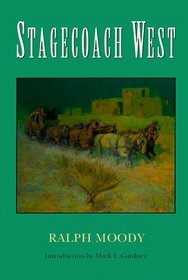Search -
Stagecoach West
Stagecoach West
Author:
A triumph of Yankee design and ingenuity, the American stagecoach sped over the primitive roads of the western prairies, deserts, and moutains from the gold-rush days of 1849 until the turn of the century. Drawn by four- and six-horse teams and driven by some of the most skillful reinsmen the the world has ever known, these singular carriages ha... more »
Author:
A triumph of Yankee design and ingenuity, the American stagecoach sped over the primitive roads of the western prairies, deserts, and moutains from the gold-rush days of 1849 until the turn of the century. Drawn by four- and six-horse teams and driven by some of the most skillful reinsmen the the world has ever known, these singular carriages ha... more »
ISBN-13: 9780803282452
ISBN-10: 0803282451
Publication Date: 9/1/1998
Pages: 341
Rating: 1
ISBN-10: 0803282451
Publication Date: 9/1/1998
Pages: 341
Rating: 1
4 stars, based on 1 rating
Publisher: Bison Books
Book Type: Paperback
Other Versions: Hardcover
Members Wishing: 8
Reviews: Amazon | Write a Review
Book Type: Paperback
Other Versions: Hardcover
Members Wishing: 8
Reviews: Amazon | Write a Review
Genres:
- History >> Americas >> United States >> 19th Century >> Old West
- History >> Historical Study & Educational Resources >> Social History
- Nonfiction >> Transportation >> General




